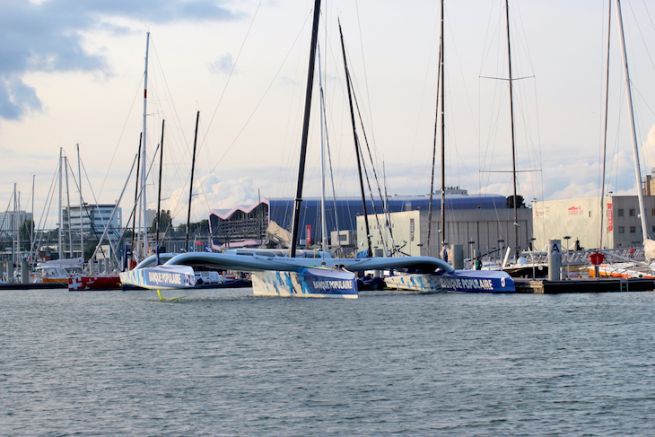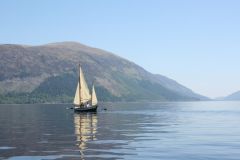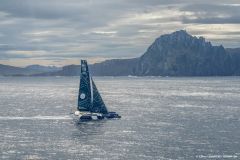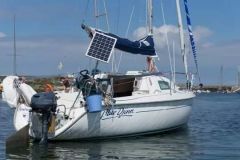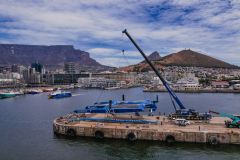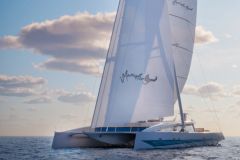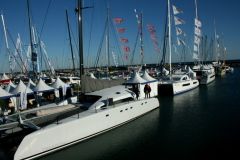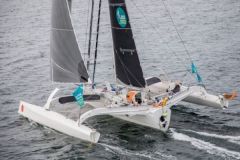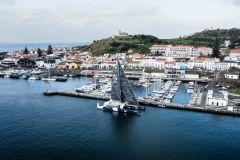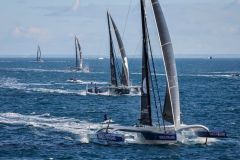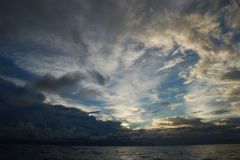What modifications were made to the boat during the refit?
The essential modifications on the boat focused on ergonomics. The disappointment of the capsizing served as a school to repair and refurbish the boat, but also to correct minor birth errors related to general ergonomics.
We deliberately launched a rather minimalist boat in order to make a transatlantic race which was the Route du Rhum. The boat was lightweight with little protection. The capsizing destroyed what little comfort there was on the boat. We therefore chose to optimize it rather than redo it identically.
We made the modifications that were already a little noticed after the first sailings, in preparation for the round the world trip. The cap was enlarged, the cockpit was closed a little more and the manoeuvres were made more protected, more comfortable and safer.
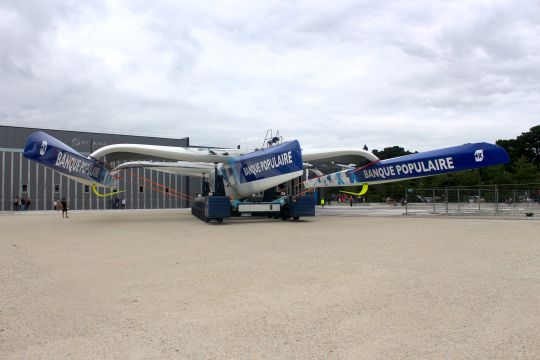
What about the specific ones for the anti-slip?
There are systems that have been around for a long time on board our boats. These are anti-slip systems that we had partially on board when the misadventure happened to us, but which were not operational. Quite simply because, when you start navigating, there is a to-do list with priorities. At the time, we were essentially sailing with a crew, so it was not our absolute priority to have this system 100% operational, but 50% operational.
Since then, we have been working hard to make this system operational. We also added a few manual release systems that we didn't have. I'm talking about mainsail sheeting, mast tipping. A lot of things were projected on the list but not implemented. Today, not only are they operational, but we have gone a little further on the accessibility of these commands to shock.
It will prevent it from happening again and it's up to us to be vigilant. But what happened to us could have happened to others. Yes, we have to question ourselves, but that's part of the risk.
So we got a little confused. We have electrical systems, electrohydraulically triggered, we have manual systems, and we have tried automatic systems. Basically, an alarm acts as a buffer value and is triggered when the boat reaches a certain list. This will trigger a valve, drop a cleat, drop a sheet, open a sail and repel the capsizing and ensure that the boat does not capsize. All this automatically.
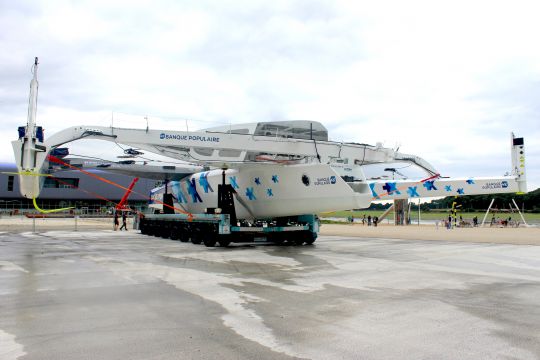
Can you tell us more about this automatic system?
It's a software, a fairly complete system. It is an electric brain, which controls mechanical valves, which actuates the cleat, which releases the sheets. The configuration is done via the software. We can influence the parameters of heel, acceleration, pitch, roll and roll. You choose all the parameters that seem right to you in terms of performance and safety.
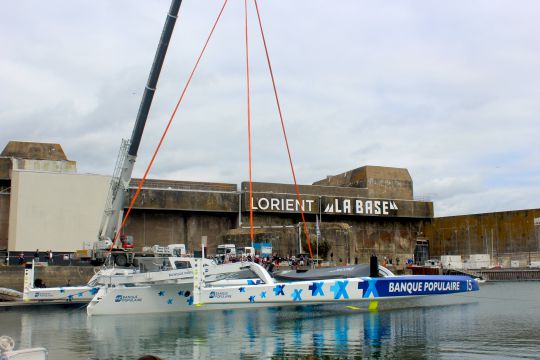
Why didn't you make some big changes?
On the one hand, I would say because the boat was rather well born, unpretentious. There are things to review, but not fundamentally. And above all, we haven't sailed much. To question everything when we haven't sailed that much, that's a mistake. Last but not least, the last parameter is that we fought a little against the weather to be back in the water, ready, efficient and competitive for the Rum.
If we had to question everything, to redo the development on each of the subjects that seemed to us to be perfectible in quotation marks, we would never have had the time to implement it. Because it involves design office, drawing, calculations... So we made the corrections we thought necessary or obvious mistakes, but we didn't redo the whole boat.
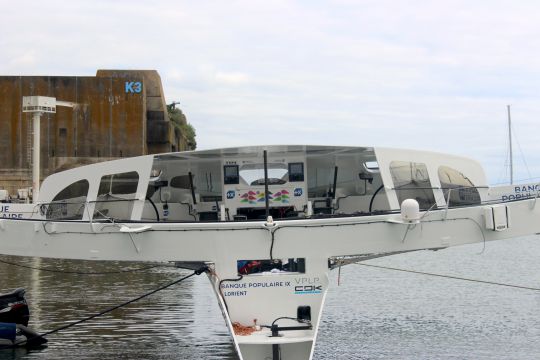
What is the objective for the coming months?
The next objective, now that the boat is rebuilt, repaired and ready to sail again, will be, as soon as possible, to be in working order to test it in all possible sea and wind conditions. We will clearly try to intensify the sailing program to try to make up for all the days lost in the pre-season.
As far as possible, and if there are no technical constraints, we will increase the number of day trips or trips over several days, offshore, with crew. It's already on this week's agenda. The boat will hit the water in a few minutes, we'll mast it and in two days we'll go sailing. We will try to repeat this very regularly, every week, over several days, in order to ensure that the work accomplished is viable and that we have few imperfections and not too many corrections to make.
Following that, we will focus on performance to ensure that we are still competitive and that Armel has every chance of winning a worthy place in the Route du Rhum. We'll start with a crew and very quickly, we'll launch it solo. Because beyond sailing to enrich your experience and the mastery of the boat, you still have the constraint of qualifying for the Route du Rhum, which is not yet acquired. If all goes well, I would say that we can imagine that within a fortnight, he will potentially be sailing solo to qualify.
These 1,200 qualifying miles are interesting enough to show everyone that the boat is capable of a series of long sails and that it is also accessible. It does not take days and days to achieve this objective.
What also reassures us is that this is not our first launch. If the boat had never sailed, or only a little, 1,200 miles would have been a light training for the Route du Rhum. We've still done more than two transatlantic races with the boat. We still have a step back, which reassures us a little. But it's obvious that you have to get up and running very quickly on your own.
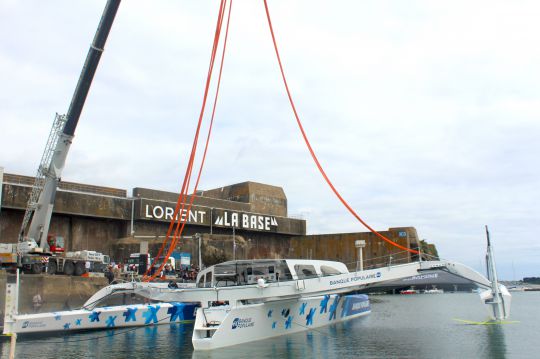
Three months is enough to be ready for the start of the DDR?
That's enough to be at the start. This is enough to have as much luck on paper as our competitors who will be present at the start. Of course, more time would have allowed us to take care of the smallest details, to refine the preparation.
In this case, we will certainly have to make concessions in certain areas, but it is still quite manageable. And once again, I would like to point out that we are not starting from scratch, we have sailed, crossed the Atlantic twice, we have done a package of offshore and coastal navigation which has enabled us to acquire performance data, but also to see the behaviour of the boat as a whole.
We are rather reassured on the fact that this boat, with Armel at the helm, is capable of crossing the Atlantic in good conditions of safety, but also with all these chances of being able to obtain a good result. Of course, it would be six months earlier, it would be even better. Our competition during this time is progressing. It's part of the game! We'll try to make sure we get back up to speed very quickly!
But everyone has their own little prize. There are those who thought they could sail a little more, but couldn't, for example. Of course the competition is tough! We're not quite in the same configuration as we were four years ago, that's for sure. The boats have evolved, are more and more efficient, demanding, there are more people at the start. The set is rich, with experience, the guys are very talented, especially two, in recent years, who share the top of the basket. So we'll see about that.
Anyway, we have everything we need to do well. We have a beautiful boat, a great team, a partner who has been following us for a very long time and takes responsibility for all our actions, so it's great.
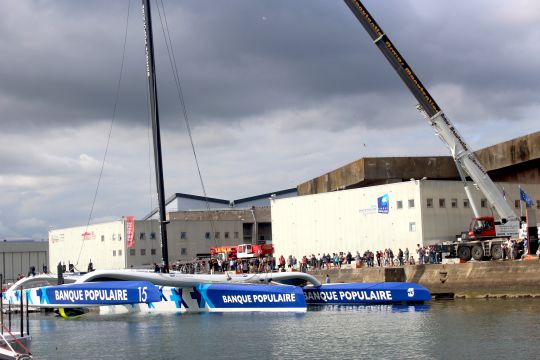
Will capsizing change the way you sail?
At the level of apprehension? Obviously a capsizing is not insignificant and it necessarily leaves a few traces because it is a small cataclysm in the preparation. If we are only talking about Armel, to get to know him well after many years of working together, I think he is someone with an incredible strength of character. He has proven this in every event he has competed in.
I think I know that he is completely recovered or at least not very affected since the story ended quite badly. He is a winner, a competitor with an anger, a thirst to win as always present. He will be sufficiently familiar with the control of his boat to support it, to set a pace when necessary, without taking any ill-considered risks.
Of course, he now has a small parameter in him that allows him to determine certain limits that we didn't have before. I don't feel it had more impact on him than that, even though we certainly would have done very well without it.
Photo credits: Bateaux.com
